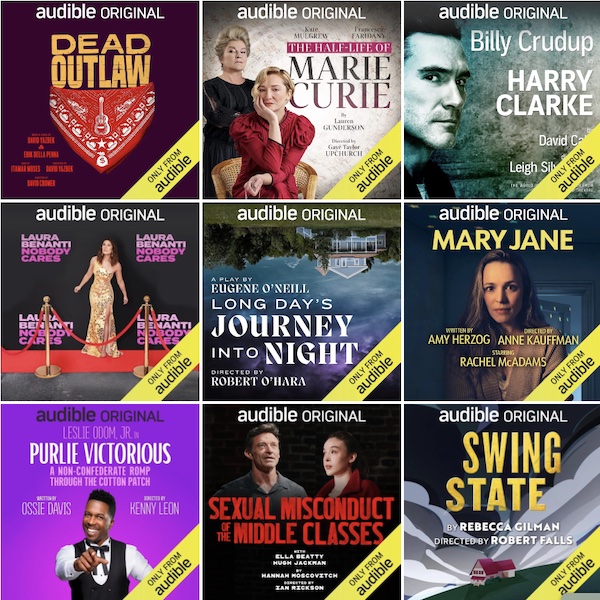Minetta Lane Theater became the home of Audible beginning in 2018 with the mission of turning live theater productions into audiobooks. Their first show was a transfer of the solo play “Harry Clarke” by David Cale starring Billy Crudup, an auspicious start: It is one of my favorite of the plays and musicals that are now available as Audible audiobooks. Below is a list of ten, alphabetically, each with a photograph from the theatrical production, as well as excerpts from, and links to, my review. Each title is linked to its Amazon Audible page, where you can listen to an excerpt of up to about five minutes from the show, and purchase the book.
Some of these shows frankly suffer somewhat from the lack of visuals — the set and costume design, the actors’ gestures and their facial expressions, stage business conducted in silence. That is why solos and two-handers tend to translate best to audio. But at least two more elaborate productions, “Dead Outlaw” and “Long Day’s Journey Into Night” are in some ways better as a listening experience, as I explain below.
You don’t need a membership in Audible to purchase individual audiobooks, but Amazon.com, which owns Audible, is offering several promotions: An “Audible Holiday Promotion” offers membership in Audible for $0.99/month for 3 months, which is available for a limited time and subject to change. You can also get a 30-day free trial: Sign up here. To purchase an annual membership (cancellable at any time), click here. To give someone a gift membership of three months, click here.
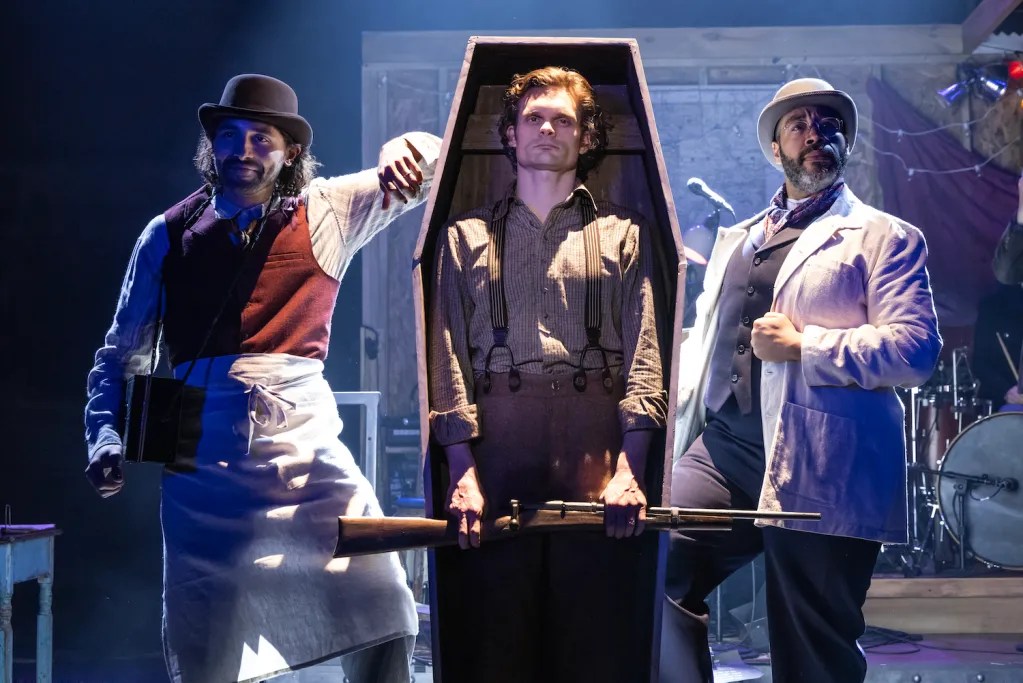
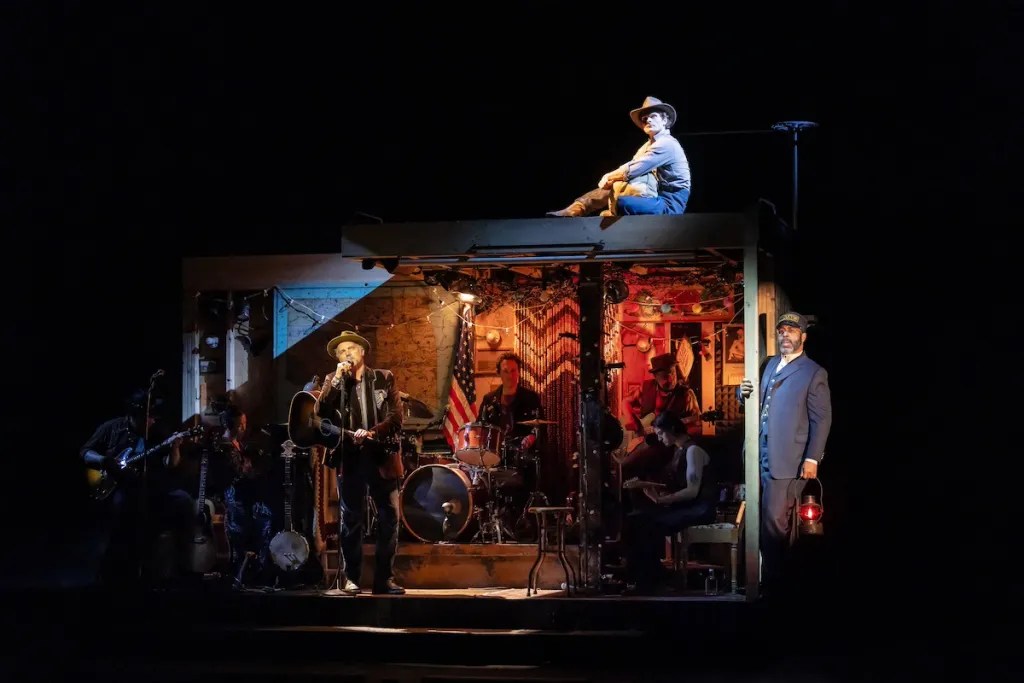
This darkly comic musical that tells the ghoulish true tale about a corpse from the Old West was so popular during its brief run Off-Broadway at Audible’s Minetta Lane Theater in 2024 that it transferred to Broadway, where it was nominated for seven Tony Awards, but won none of them, and closed after two months.
As the first musical that Audible commissioned, it’s a good test case of whether an audiobook recording of a full theatrical production can be a satisfying experience. I had an outlier opinion of the show when I saw it at Minetta Lane Theater, and I find the audiobook in several ways an improvement: You can listen to the music as you would a cast album, and don’t have to stare at an actor (Andrew Durand) portraying a corpse for half the 100-minute show.
From my 2024 review:
Elmer J. McCurdy was killed in a shoot-out with sheriff’s deputies in Oklahoma in 1911, but took 66 years to be buried, his mummified remains having been exhibited all that time by a series of macabre showmen.
I didn’t have to wait as long to see “Dead Outlaw” – just until a couple of weeks before the end of its brief run at the Minetta Lane Theater. But that was long enough for the novelty to wear off that a Tony-winning team of theater artists had put together a musical about such a bizarre true story. Composer David Yazbek, librettist Itamar Moses, and director David Cromer are not merely a higher caliber of macabre showmen; they are the team behind “The Band’s Visit,” and their talent is reflected in some of the cleverer musical numbers in their latest show, backed by a busy ensemble and a felicitous folk-rock band.
But this self-conscious slice of Americana winds up almost as creepy as clever, and less resonant than it might intend.
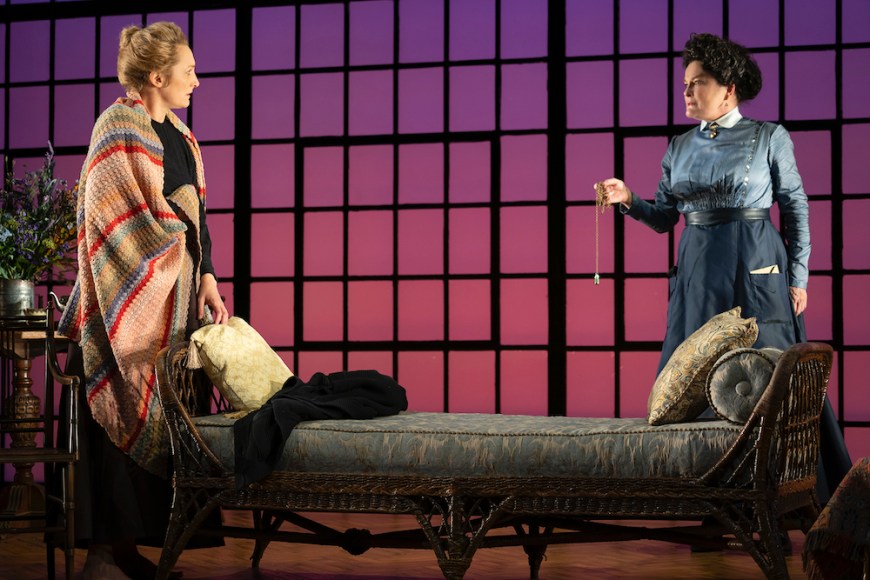
From my 2019 review
Marie Curie won the Nobel Prize twice, but she was also a woman; so the Nobel committee asked her not to show up at the ceremony. We learn the specific reason why early on in this well-intentioned, workmanlike play by Lauren Gunderson about the friendship between two world-class women scientists who lived a century ago. But first each of the women gets a monologue to introduce herself and her major accomplishment: French/Polish physicist Marie Curie, discoverer of radium (portrayed by Francesca Faridany, who starred as the teacher Siobhan in The Curious Incident of the Dog in the Night-Time) and British electromagnetic engineer Hertha Ayrton, who stopped electric lights from their incessant hissing, (portrayed by Kate Mulgrew, Captain Janeway on “Star Trek: Voyager,” and Red in “Orange is the New Black.”)
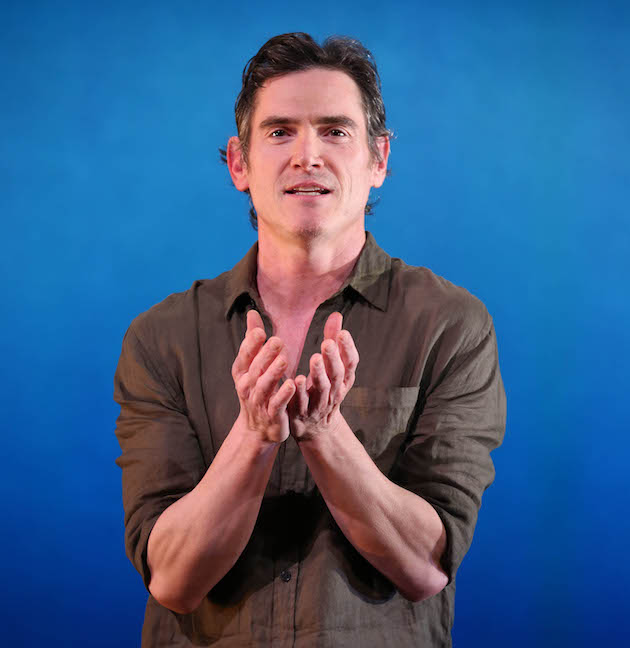
I saw Harry Clarke in 2017 at the Vineyard Theater, a year before it transferred to the Minetta Lane.
From my 2017 review
“Who are you?” Billy Crudup asks near the end of “Harry Clarke,” as he looks in an imaginary mirror, a tight spotlight on his face, the rest of him in darkness. It’s the question animating David Cale’s 80-minute solo show about a man’s fake identity overtaking his real one. In several of its particulars, this play at the Vineyard Theater about an orphaned, bisexual con man seducing his way to luxurious living recalls “The Talented Mr. Ripley.”
It takes a charismatic performance by the talented Mr. Crudup to make something undeniably entertaining out of Cale’s familiar and improbable yarn.

Laura Benanti’s autobiographical show is the only show on this list that I did not attend in person, only listening to the audiobook. (I couldn’t get a ticket to the live stage show; one of the drawbacks of the Audible theater set-up is how short the runs usually are.) It’s also the only show that mocks Audible for recording it.
“My name is Laura Benanti….”
“Nobody cares,” a chorus of voices interrupts her, repeatedly.
“Yes they do,” Benanti argues. “Audible clearly thinks enough people care; they are recording the show and putting it on their platform…”
“Have you looked at their catalog?” the chorus responds in unison. “You are gonna get buried alive in there. It’s not a sustainable business model.”
From my 2024 review:
Live on stage, “Nobody Cares” surely came across as a cross between stand-up comedy and a cabaret act, with Benanti singing five original songs that she co-wrote with Todd Almond (who, along with the members of his band, voice Benanti’s inner demons.) But the audiobook feels less like entertainment than straightforward memoir, as Benanti talks of her performing career, her dating life, and her experiences as a mother….there are moments on the audiobook that made me feel left out for not having been in the theater. Several times, there are bursts of audience laughter, unexplained. I assume these were because of a moment of Benanti’s trademark physical comedy or comic expression….Yet, listening to “Nobody Cares” as an audiobook offered an experience that in other ways was enhancing.
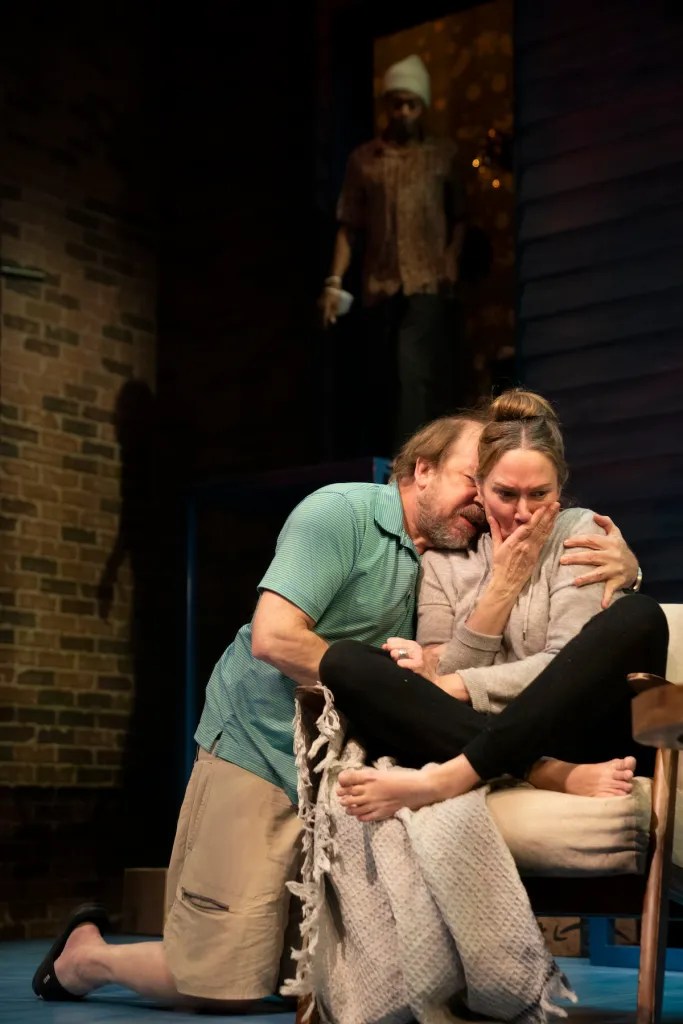
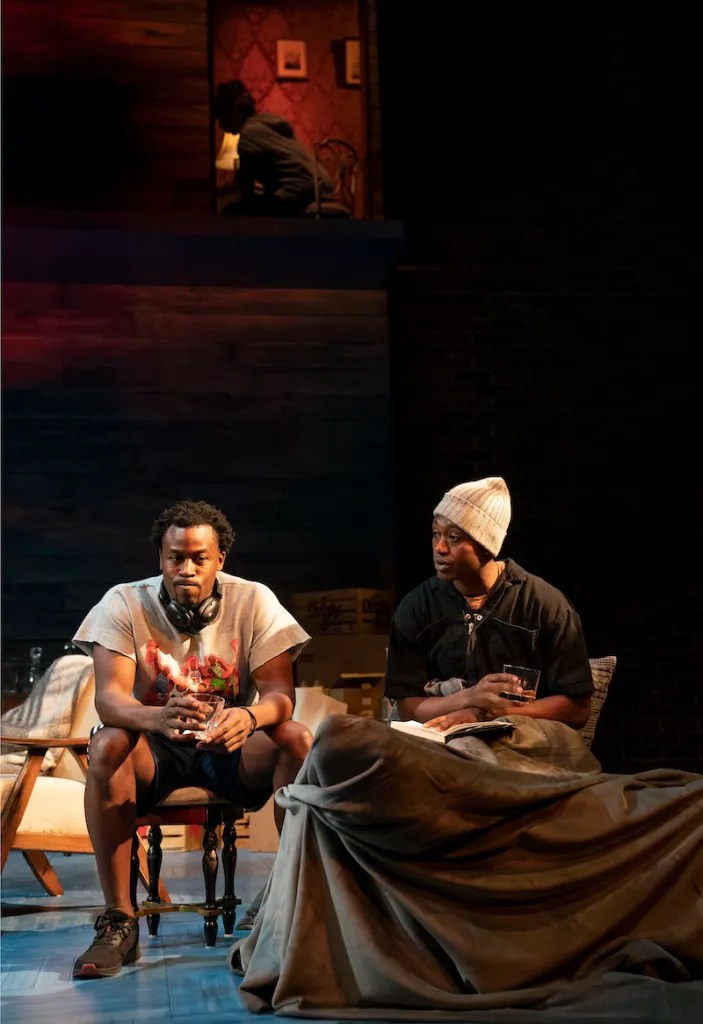
Director Robert O’Hara made two big changes in Eugene O’Neill’s epic play. He did a visual makeover to transpose the setting from 1912 to a COVID-plagued 2020. He also cut the length of the play almost in half. The first change is far less evident when it’s turned into an audio drama; the second might be welcome by many listeners. This makes my tepid review somewhat moot.
From my 2022 review:
James Tyrone (Bill Camp) is wearing a face mask and shorts, and bringing home Starbucks takeout, while Mary Tyrone (Elizabeth Marvel), in sweatpants, is doing yoga, near a pile of Amazon boxes, a bottle of hand sanitizer, and a TV set turned to CNN with the latest news from Chris Cuomo about the coronavirus. James may still be the once great Shakespearean turned hack actor, Mary the once beautiful convent girl who gave up a promising music career to marry a matinee idol; as the day progresses, they and their two sons (Ato Blankson-Wood and Jason Bowen) are still full of regrets and recriminations, drink and drugs. But this long day is no longer taking place in 1912 in director Robert O’Hara’s slickly abridged and unwisely updated version of Eugene O’Neill’s tragedy about his family, deemed one of the greatest American plays ever written. They are now living in the pandemic of 2020….If O’Hara’s “Long Day’s Journey Into Night” still offers its satisfactions – above all, as a showcase for its fine quartet of actors — this was in spite of his changes, not because of them.
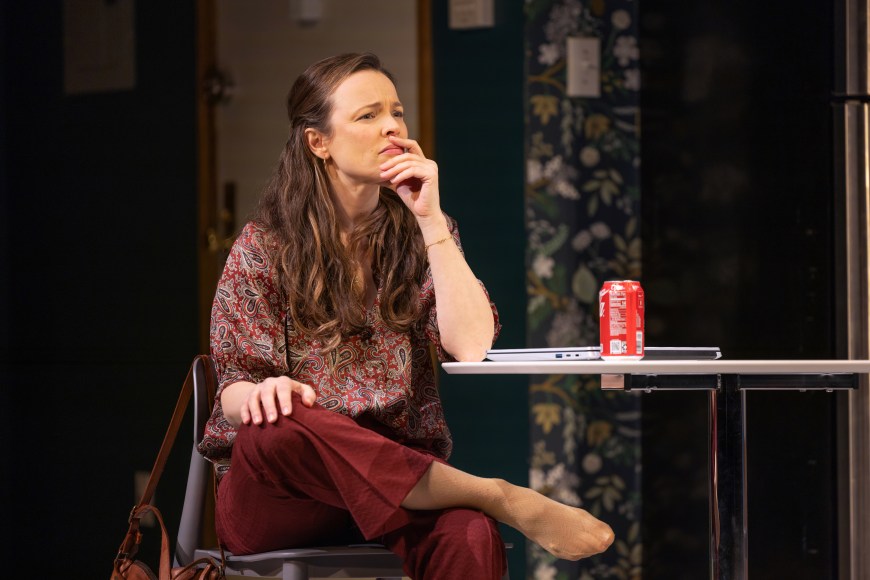
This is one of the two audiobooks on this list of shows that were not produced at the Minetta Lane Theater. It’s a recording of the terrific Broadway production of Amy Herzog’s play.
From my 2024 review:
Rachel McAdams might at first seem to be miscast in her first role on Broadway. She portrays the title character in Amy Herzog’s deceptively casual play about the mother of a severely disabled son. Alex’s birth two years earlier has completely upended Mary Jane’s life. Her husband abandoned her because of Alex, and taking care of her child is so time-consuming that she had to abandon her studies (she had planned to be a teacher.) It’s also so costly she was forced to take a menial job just for the health benefits, and she’s about to lose even that, because of an (unseen) boss who pretends to care. Yet here is McAdams, fresh-faced and cheerful, like her beloved character Kate in “Slings & Arrows,” the twenty-year-old Canadian TV series about a fictional Shakespearean festival, at the start of a movie career with starring roles in such popular films as “The Notebook” and “Mean Girls” and as an Oscar nominated journalist in “Spotlight.”
I saw “Mary Jane” in its Off-Broadway production seven years ago, and I remember the actress portraying Mary Jane as more matter-of-fact, less sunny.
It took me a while this time around to realize how well McAdams’ approach fits the character. McAdams winds up startlingly effective in a play whose weight and power sneak up on you.


This historical hip-hop musical is not available as an audiobook until next June.
From my 2025 review:
In its thrilling opening rap, “Mexodus” gives an overview of the little-known history of Mexico as a refuge for thousands of escaping American slaves before the Civil War. Rhythmic, uncommonly melodic, densely informative, “Two Bodies” may remind you of another opening number, from a certain Broadway musical that’s also based on American history.
Unlike “Hamilton,” though – or “1776” or “Suffs” or “Assassins” – “Mexodus” doesn’t keep strictly to the historical record after that. This is in part because so little of this particular history was recorded. But Brian Quijada and Nygel D. Robinson, the talented creators and stars of this two-man musical, also seem less interested in dramatizing the history than in riffing on it.

Purlie Victorious: A Non-Confederate Romp Through the Cotton Patch
This was the other show on this list that was not produced at the Minetta Lane Theater
From my 2023 review
It’s hard to picture a better cast for this first Broadway revival of Ossie Davis’s 1961 broad, biting comedy about racism in the Old South. As the title character, Leslie Odom Jr., assuming the role originated by Davis himself, feels especially well-matched. Odom of course made his name on Broadway delivering with uncommon clarity the pithiest raps in “Hamilton,” as smooth-talking, untrustworthy but surprisingly sympathetic Aaron Burr. Similarly, as Purlie Victorious Judson, a newly-minted preacher, Odom must toggle between sounding like a comic mountebank (“I ain’t never in all my life told a lie I didn’t mean to make come true, some day!”) and like an impassioned civil rights advocate (“We want our cut of the Constitution, and we want it now: and not with no teaspoon, white folks – throw it at us with a shovel!”)
As deft as the acting is, the audience also winds up toggling – between the (sometimes outdated) comedy of the plot and the (often still timely) underlying outrage.
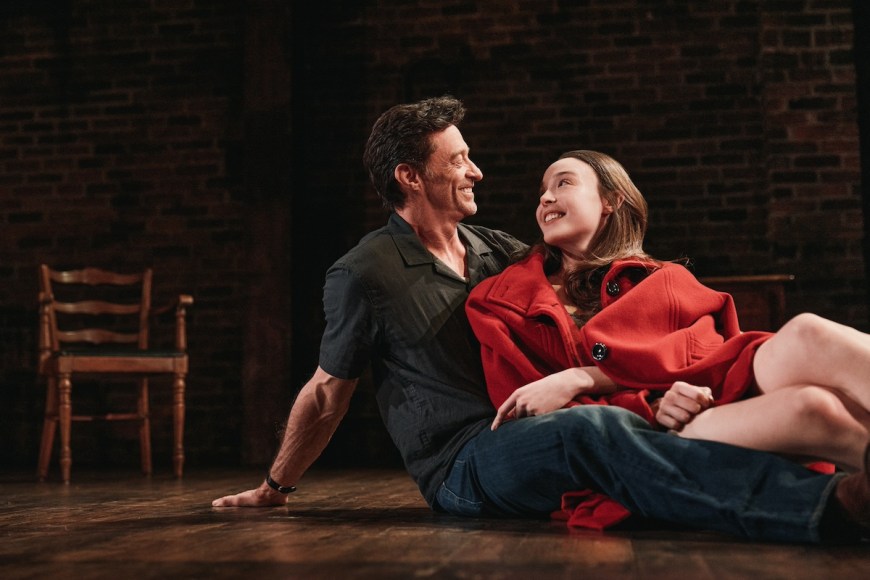
Sexual Misconduct of the Middle Classes
From my 2025 review
A sexual affair between Hugh Jackman as a married middle aged professor and Ella Beatty as his 19-year-old student? On its surface, “Sexual Misconduct of the Middle Classes” tells a familiar story with an overblown title and an underwritten female character….I did find some nuance…an effort to subvert the typical interpretation (by men of the middle classes?) of “May/December romances.” This subtly #MeToo story is so explicitly from the man’s point of view that it demolishes that point of view.
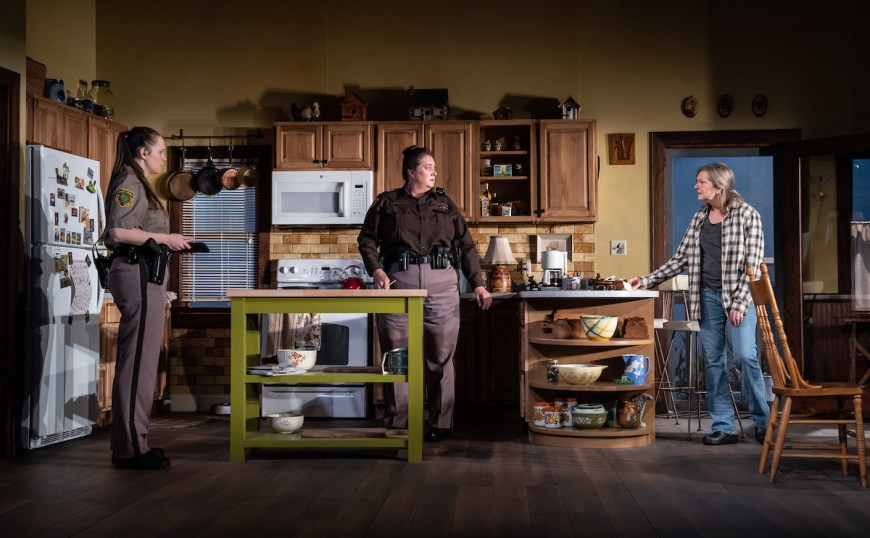
From my 2023 review
Peg is unhappy, not just because her husband died a year ago, but also because it’s been ages since she’s seen a bat on the prairie that surrounds her house in rural Wisconsin.
“You want to see a bat?” Ryan asks, surprised.
“Of course I want to see a bat….They’re flying mammals for f—‘s sake.”
Peg is alarmed that local bats are being killed off by a fungus, and they’re not all
that are under threat. She worries about the scarcity of chorus frogs, whip-poor-wills, wildflowers, Monarch butterflies, nighthawks, the decimation of bugs so thorough that she calls it the “insect apocalypse.” She also worries about her friend Ryan, a troubled young man recently released from prison.
After listening to Peg’s catalogue of doomed wildlife, Ryan remarks sarcastically: “You’re a f—ing ray of sunshine.”
“Swing State,” a play running at Minetta Lane Theater that will eventually be an Audible Audiobook, is itself something of a catalogue of sadness and loss, its four human characters as devastated in their own individual ways as the flora and fauna around them. Yet, for all the trauma, I’m not being sarcastic when I call Rebecca Gilman’s play something close to a ray of sunshine. That can be the effect of a well-made play directed sensitively, solidly designed, and performed by a pitch perfect cast.
I earn a small commission from purchases made at some of the links in this post.
Like this:
Like Loading…
Related

